Maersk will enhance global research efforts on weather patterns and climate change with its entire fleet until the end of 2020. The giant carrier announced the addition of another 300 vessels to participate with all its ships in the global Voluntary Observing Ship (VOS) programme.
The recorded data helps meteorologists create more accurate weather and storm forecasts and will also be used in the creation of atmosphereocean models that will help scientists better understand climate change, according to a statement.
“Helping weather forecasting and climate science advance makes great sense to us, since both of these areas affect our operations in various ways,” said Aslak Ross, Maersk’s head of marine standards.
Ross noted that climate change is one of the biggest challenges facing the global community and highlighted Maersk’s strategy to decarbonise its fleet of vessels by 2050.
While scientists have been collecting and sharing weather and ocean condition observations for over 150 years around the world, technological advances have significantly increased the amount of information which can be shared.
A typical VOS records and transmits observations manually, with a vessel crewmember reading data from instruments onboard the ship, or in some cases through automated weather stations (AWS). The data is then sent to the various National Meteorological Services for use in weather prediction models and to monitor actual conditions at sea.
The first five Maersk vessels participating in the VOS programme are equipped with a more advanced type of AWS, called the European Common Automatic Weather Station (EUCAWS). The EUCAWS system automatically collects data on atmospheric pressure, air temperature and relative humidity and transmits them hourly to designated research stations.
By the end of 2020, a total of 50 such stations are planned to be operational on Maersk vessels, providing the largest fleet of AWS from a single company.
“If we can help create even marginal improvements to the quality of weather routing services, these will be important levers in our constant efforts to improve the safety of our crews and assets and ensure reliable arrival times for our customers’ supply chains,” commented Ross.
While over 3,000 ships are involved in the VOS programme, overall participation has declined in recent years due to the reduction in the global commercial fleet’s financial and crew resources. New technologies such as AWS and electronic logbooks, however, have led to an increase in the quantity and quality of observations from each vessel.
In the US, Maersk has worked actively with a VOS partner organisation and the US National Oceanic and Atmospheric Administration (NOAA) on a variety of environmental programmes. These have included testing air quality and vessel stack emissions and whale protection programmes on both coasts.







